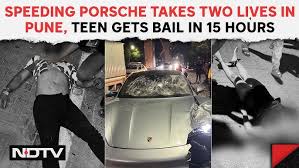As we contemplate the tragic loss of two young lives in Pune, ruthlessly taken by an irresponsible teenager. But while we share the families’ pain, we can’t ignore the glaring flaws in our criminal justice system. If the drunk, reckless rich kid was out of line, what about the Juvenile Justice Board that treated his crime like a minor slip-up?
A Pattern of Irresponsibility
The way we deal with reckless driving and road safety is appalling. Citizens are drawing parallels to the infamous 2002 Salman Khan hit-and-run case, which dragged on for 13 years before the actor was acquitted. Such delays are the root of our justice system’s problems, encouraging individuals to flout the law without fear, much like the young Porsche driver in Pune.
Delays Lead to Disrespect
The blatant disregard for the law stems from the endless delays in our trials. If criminal cases wrapped up within a year, with appeals resolved promptly, there people might think twice before breaking the law. Parents might hesitate before handing car keys to their minors, and bartenders might refuse to serve them alcohol.
The Grim Statistics
But our current reality is grim. The ‘Crime in India (2022)’ report by the National Crime Records Bureau shows over 90% of death-by-negligence and hit-and-run cases are pending, with conviction rates as low as 30% in big cities. It’s a bit better elsewhere, but not by much.
The Real Impact of Delays
The disrespect for law stems from our snail-paced trials.
Delayed trials mean witnesses go missing, and memories fade, hurting the prosecution. The judicial process is a tedious mess, and many criminals walk free. Why isn’t the government investing in faster judicial processes?
Understaffed and Overworked
In December 2023, Parliament revealed that India has just 21 judicial officers per million people, far below the Law Commission’s recommendation of 50 per million. The police are similarly stretched thin, with a ratio of 152 per lakh citizens versus the international norm of 222 per lakh. Despite these challenges, state police manage to dispose of criminal cases quickly, though there’s room for improvement in quality.
Juvenile Justice Under Scrutiny
This case has also put a spotlight on juvenile justice. The Juvenile Justice (Care and Protection of Children) Act, 2015, allows for serious crimes by 16-18-year-olds to be tried as adults. Yet, the Pune Board let the teen go with a slap on the wrist: an essay, 15 days with traffic police, and some counseling. A tragic joke when two lives were lost.
A Call for Real Justice
The Pune Police have charged the boy with culpable homicide, and are appealing to try him as an adult. They’ve also booked his father and the restaurants that served him alcohol. The minor claimed his father knew he was drinking and handed him the car keys regardless.
Culpable homicide not amounting to murder is a serious offense with a 10-year imprisonment penalty and a relatively better conviction rate of 40%. The Maharashtra government’s decision to try the Porsche driver as an adult is a step in the right direction.
Background: The Incident
The Pune police reported that the 17-year-old who crashed the Porsche, killing two, had been drinking hours before. The boy, from a prominent real estate family, was arrested soon after the accident. Evidence, including CCTV footage, shows he was out drinking with friends. Despite claims of police inaction, the Pune Police Commissioner insists they’re handling the case seriously, charging the boy with culpable homicide and pushing to try him as an adult.
Wake-Up Call
This case has jolted us into acknowledging the need for better road safety and responsible driving, just like the 2012 rape case sparked outrage against violence towards women. We must hold ourselves accountable for traffic rules and responsible parenting. Let’s remember Aneesh Awadhiya and Ashwini Koshta by pushing for real change in road justice.



